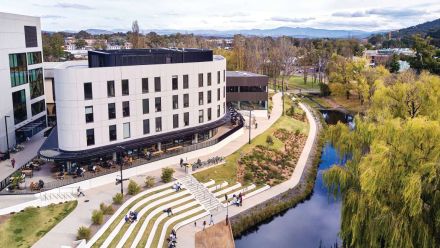Out of the dark: beating anorexia
Living with an eating disorder was like living in a prison. Internally I was trapped in obsessive routines driven by guilt and self-hatred.
In the new ANU Reporter, undergraduate student RACHAEL STEVENS opens up about her struggles with anorexia and severe depression.
Subscribe to receive the next print edition of ANU Reporter.
There's that old saying that "what doesn't kill you makes you stronger". To be honest, I never really understood what it meant.
It wasn't until I nearly lost my life that I discovered that overused cliché had some truth to it.
When I was 15, I collapsed at school. I was rushed to the emergency unit and placed on a set of scales. It was then my secrets began to spill out, secrets I had been hiding since I was six years old.
That day at the hospital I was told that I wasn't just physically sick. That was the day I discovered I was suffering from a mental illness; severe anorexia nervosa.
Living with an eating disorder was like living in a prison. Internally I was trapped in obsessive routines driven by guilt and self-hatred. Despite how dangerously low my weight became, I would look in the mirror and feel disgusted and repulsed.
I desperately wanted to become invisible and fade away into nothing. Starvation offered me that, but came at a great cost.
I was placed in a wheelchair
In hospital I was placed in a wheelchair, threatened with a feeding tube and told my organs were shutting down. I was at risk of going into cardiac arrest.
Yet, the things that didn't kill me somehow made me stronger. Hospital was my opportunity to stop pretending and receive the help I desperately needed.
In the psychiatric ward where my situation was at its ugliest, I made the decision I wanted to live. After I was challenged by the words of another dying patient - "You must have some reason to get out of bed in the morning?" - I became determined to live. I discovered my faith and began to hope for the future.
This hope carried me through the next four years of intensive outpatient treatment. I put on 20 kilograms, finally reaching the healthy weight range.
Despite fixing things externally, however, the real battle was taking place in my mind. I felt I was constantly at war with thoughts of worthlessness, making me increasingly despondent and disconnected from reality.
That feeling of numbness
At 17, my diagnosis was clinical depression. I was admitted into psychiatric care on more than three occasions for attempting to take my life. I thought that feeling of numbness and pain would never leave - but it did.
I am now 23 and fully recovered from anorexia and clinical depression. It has been a challenging and almost impossible journey at times, but I am so grateful to be alive.
My experiences of overcoming a mental illness have enriched my life. I know personally that what hasn't killed me has made me a more compassionate person.
There is hope
I believe our hardest battles can shape who we are for the better, producing perseverance, maturity and hope in our lives. My time spent with young people in psych wards revealed to me that there is hope in the most broken places.
Out of my darkest moments has emerged a love for people and a passion to see them cared for, listened to, and loved.
I have realised how much people truly matter and the joy that comes from helping them. This has inspired me to spread a message of hope and recovery.
I have written a book called The Skeleton Diaries, which demonstrates to young people that their past does not have to be their prison. I also speak to young people in schools and create artwork.
Coming so close to death on so many occasions has shown me that life is short and incredibly valuable.
Every day I feel extremely grateful to be alive, healthy and able to breathe, study, help people and share time with those I love.
Living, walking and breathing this journey has shown me that there is hope in hopeless situations and we can help others find it.


